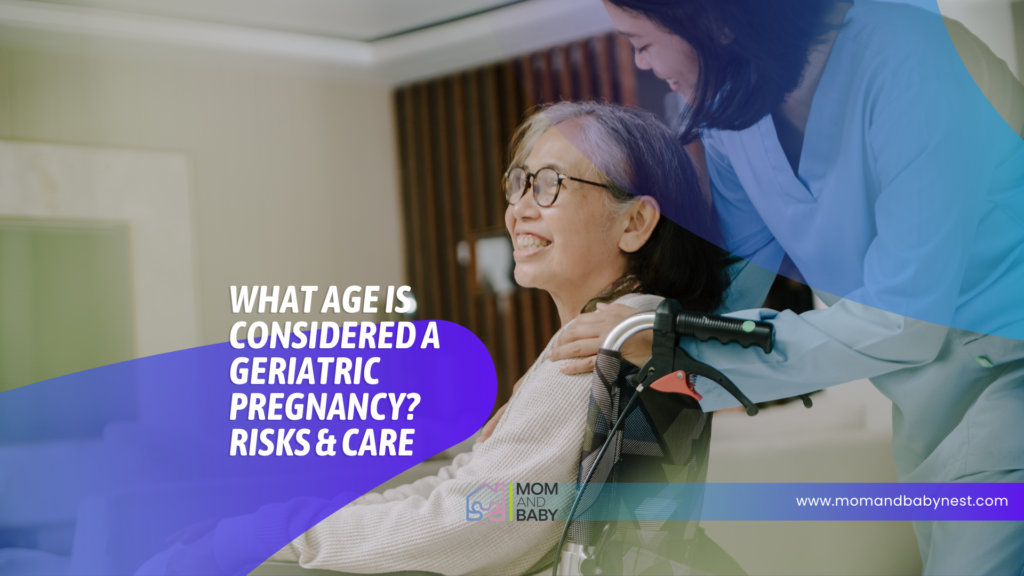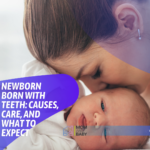Geriatric pregnancy refers to a pregnancy that occurs in women aged 35 years or older. This age threshold is often considered high-risk due to potential complications, though many women over 35 have healthy pregnancies with the right care.
Pregnancy at an older age can be a fulfilling experience, but it comes with unique challenges. In this article, we’ll explore what age is considered a geriatric pregnancy, the associated risks, and tips for navigating pregnancy at 35 and beyond.
Geriatric Pregnancy Definition

A geriatric pregnancy is defined as a pregnancy that occurs when a woman is 35 years of age or older. While this term is commonly used in medical settings, it does not reflect the ability of older women to have a healthy pregnancy. Rather, it refers to the fact that advanced maternal age increases the likelihood of certain complications during pregnancy.
Geriatric Pregnancy Age Range

- The geriatric pregnancy age range is typically considered to begin at age 35. However, many women over this age have successful pregnancies with the appropriate care. The use of assisted reproductive technologies has made it more common for women in their late 30s and early 40s to have children.
Geriatric Pregnancy Risks

Pregnancy over 35 comes with some increased risks, though many of these can be managed with proper medical care. Some of the most common risks include:
- Chromosomal abnormalities: The risk of conditions like Down syndrome increases with maternal age.
- Gestational diabetes: Older mothers are at a higher risk for developing gestational diabetes.
- Preeclampsia: High blood pressure during pregnancy becomes more common in older women.
- Miscarriage: The risk of miscarriage increases with age, particularly after 40.
- Preterm birth: Women over 35 may have a higher likelihood of delivering prematurely.
Understanding these risks and seeking high-risk pregnancy care early on can significantly improve outcomes.
How to Prepare for a Geriatric Pregnancy?

Preparing for a geriatric pregnancy involves taking a few key steps to ensure both maternal and fetal health:
- Consult a healthcare provider: A preconception checkup is essential for discussing health history, medications, and any possible risks.
- Adopt a healthy lifestyle: Prioritize a balanced diet, regular exercise, and maintaining a healthy weight to reduce pregnancy complications.
- Genetic counseling: Consider genetic testing to assess the likelihood of chromosomal conditions.
- Regular prenatal visits: Consistent care from an obstetrician experienced in geriatric obstetrics ensures early detection of any issues.
Is 35 Considered a Geriatric Pregnancy?

Yes, pregnancy at 35 or older is generally classified as a geriatric pregnancy. While this age is often associated with increased risks, many women experience healthy pregnancies with the right prenatal care. The key is early detection and monitoring of potential complications.
Effects of Older Maternal Age
The effects of older maternal age on pregnancy can vary. Women over 35 may face higher risks for certain complications, but they are also often more financially stable and emotionally mature. With the right support and healthcare, many women in this age group deliver healthy babies.
Geriatric Pregnancy Statistics
In recent years, geriatric pregnancy statistics show that more women are choosing to have children later in life. The number of pregnancies in women over 35 has been steadily increasing, largely due to advancements in fertility treatments and improved healthcare.
Support for Older Pregnant Women
Many women over 35 benefit from geriatric pregnancy resources, which provide emotional and practical support. Support groups for older pregnant women and geriatric pregnancy support groups offer a network for sharing experiences and advice.
Conclusion
While geriatric pregnancy can come with increased risks, it is possible to have a healthy pregnancy over 35 with the right care. Prenatal care for older mothers, regular check-ups, and a healthy lifestyle are crucial for managing complications. Don’t let the term “geriatric” discourage you; many women over 35 have safe and fulfilling pregnancies with the appropriate medical support and resources.
FAQs

What is a geriatric pregnancy?
A geriatric pregnancy refers to a pregnancy that occurs in a woman aged 35 or older. This age is associated with an increased risk of certain pregnancy complications but does not necessarily mean problems will occur.
Is 35 considered geriatric pregnancy?
Yes, 35 is considered the age at which a pregnancy is categorized as geriatric. While it may be associated with some increased risks, many women in this age range have healthy pregnancies with the right care.
What are the risks of a geriatric pregnancy?
The risks of geriatric pregnancy include higher chances of miscarriage, gestational diabetes, preeclampsia, and chromosomal abnormalities such as Down syndrome. Regular prenatal care can help manage these risks.
How can I prepare for a geriatric pregnancy?
To prepare for a geriatric pregnancy, schedule a preconception checkup, maintain a healthy lifestyle, consider genetic counseling, and have regular prenatal visits with a doctor experienced in geriatric obstetrics.
Can I have a healthy pregnancy at 40?
Yes, many women over 40 have healthy pregnancies with the right care and monitoring. It’s important to work closely with your healthcare provider to manage any risks associated with older maternal age.



